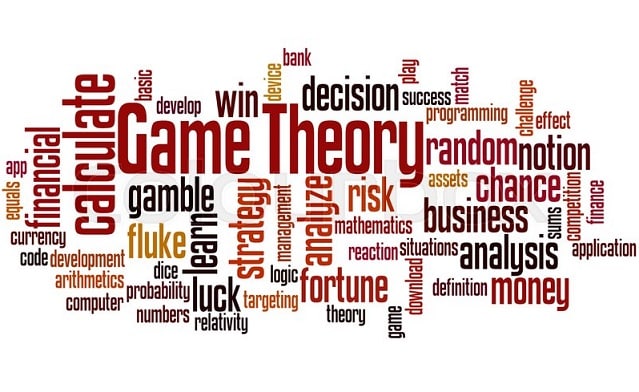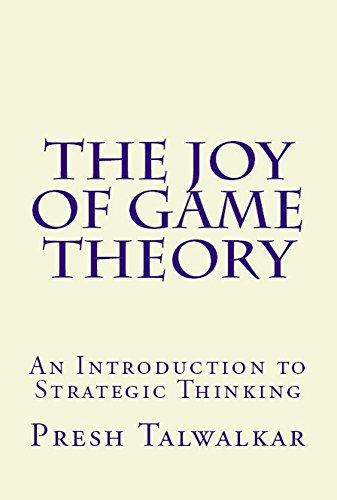
DISCLOSURE: This post may contain affiliate links, meaning when you click the links and make a purchase, I receive a commission. As an Amazon Associate I earn from qualifying purchases.
Although it is often used in economics, game theory can be applied wherever and whenever professionals or other decision-makers interact strategically and follow rules-based behavior. A major challenge with learning game theory is that it is mentally challenging.
What are the Books on Game Theory to read?






However, there are books on game theory that simplify the subject and make it a lot easier for anyone to understand. And investing in such books is one of the smartest steps to take if you’ll be working with game theory.
Best Books on Game Theory: Our Top Picks
As with any other subject, more-than-countable books have been written on game theory. But since there’s certainly no way you can lay your hands on every book on the subject, you have to go with only one of few of the best options available.
Here, we’ve put together a list and brief reviews of the best books on game theory.
1. Game Theory: An Introduction
Game Theory: An Introduction exposes readers to the ideas behind game theories and their applications. Throughout the book, the author employed a unique style that combines strict consistency with accessibility. Starting with a concise description of rational decision making, the author goes on to discuss strategic and extensive form games with complete information as well as Bayesian games, and extensive form games with imperfect information.The author presents the idea of rationality and explores its implications for multi-person decision problems through concepts like dominated strategies and rationalizability. The book covers a host of topics that includes multistage and repeated games, bargaining theory, auctions, mechanism design, signaling games, reputation building, and information transmission games.
The book explains difficult concepts in game theory in an exceptionally clear and simple way, making it a great option for readers with a minimal background in mathematics. It features several examples drawn from different fields including economics, political science, and business strategy. These examples, which show the wide range of applications of game theory, make the book interestingly robust and fun to read.
Rendered in a conventional and clear writing style, this book would be very useful to advanced undergraduates and students at honors or master’s levels. It can also be used by Ph.D. students seeking a fast, not so mathematized introduction to the field.
- Author: Steven Tadelis
- Publisher: Princeton University Press
- Current Edition: First edition (January 2016)
- Pages: 416
2. Theory of Games and Economic Behavior: 60th Anniversary Commemorative Edition
The author explains how game theory revolutionized economics and birthed the entirely new field of scientific inquiry, and how the theory has since been widely used to analyze a host of real-world phenomena including optimal policy choices of presidential candidates, analysis of vaccination policies, and even major league baseball salary negotiations.
The sixtieth-anniversary edition of the book includes a foreword by Harold Kuhn, an American mathematician who studied game theory, and an afterword by Ariel Rubinstein, an Israeli economist who also mastered game theory. It also includes reviews and articles on the book itself as published the New York Times, the American Economic Review, and a variety of other publications. These writings provide readers an unmatched opportunity to fully appreciate how well the book explains game theory and its real-world applications.
- Author: John Von Neuman, Oskar Morgenstern, Harold William Kuhn, Ariel Rubinstein.
- Publisher: Princeton University Press
- Current Edition: Anniversary Edition (April 2007)
- Pages: 776
3. Game Theory 101: The Complete Textbook
In Game Theory 101, the author, William Spaniel, presents a user-friendly introduction to game theory. The book is divided into four lessons, which are further divided and the resulting lessons are branched further still. It would be better to think of the book having four sections and each section having several chapters and subchapters.
The author did an excellent job of laying the foundation for the latter part of the book in the initial part by presenting clear examples and introducing the concepts that are better clarified in the later chapters. By the time you finish with the book, you’d have been accustomed to these and other concepts.
However, while the algebra is not overly difficult, the author assumes that the reader is well versed in algebra and just writes out the formula without any explanation of each of the steps used to get the final result. So, if you’re not familiar with algebra, you might not flow along so well with certain parts of the book.
- Author: William Spaniel
- Publisher: CreateSpace Independent Publishing Platform
- Current Edition: First Edition (September 2011)
- Pages: 276
4. The Complete Idiot’s Guide to Game Theory: The Fascinating Math Behind Decision-Making
The Complete Idiot’s Guide to Game Theory presents an analysis of the rigor of strategic thinking while using as little mathematics as possible. The book generously employs examples to help you to fully understand the various concepts in game theory. It also touches on the history of game theory as well as the contributions of John Nash, the Nobel Prize-winning author of “A Beautiful Mind “, which include the logical underpinnings of modeling within this theory.The book is complete with a thorough, non-technical introduction that reflects not only classical theory but also experimental evidence. The topics are well organized to help you reflect logically on the presented concepts. And the author’s writing style is not only clear but also engaging with simplistic presentations that are easy to understand.
The book builds intuition for the basic cases of game theory and systematically guides you to broader situations, imperfect information and signaling, cooperative games and fair division problems, voting systems, auctions, and lots more.
- Author: Edward C. Rosenthal
- Publisher: Alpha Publishers
- Current Edition: First Edition (March 2011)
- Pages: 381
5. Game Theory by Maschler et al
The book Game Theory is a wonderful introduction to the subject it covers. It is written in a way that makes it perfect as both a text for game theory a reference resource. Although the authors adopted a mathematical approach in the explanations, the mathematical points are easy to understand. Each chapter of the book ends in a wide range of exercises that would enhance readers’ understanding of game theory.
The authors provided an exceptionally clear and comprehensive introduction to both cooperative and noncooperative game theory. And they put together an in-depth exposition of the key mathematical results with a wealth of examples drawn from a wide range of subjects.
The book covers classical game theory which includes utility theory, equilibrium refinements, and belief hierarchies. It further explains the classical cooperative game theory, including the core, Shapley value, bargaining set, and nucleolus. In addition, major applications, including social choice, auctions, matching and mechanism design; and the relevant mathematics of linear programming, and fixed-point theory were also explained. The comprehensive coverage, as well as the analyses, makes it an ideal book to study to understand game theory. It’s also a must-add to the shelves of working game theorists.
- Author: Michael Maschler, Eilon Solan, Shmuel Zamir
- Publisher: Cambridge University Press
- Current Edition: First Edition (May 2013)
- Pages: 1003
6. The Art of Strategy: A Game Theorist’s Guide to Success in Business and Life
The Art of Strategy: A Game Theorist’s Guide to Success in Business and Life is an engaging, comprehensive guide to strategies as applicable to everyday life. The first part of the book focuses on standard game theory, graphical notations for various problems, and applications of the prisoner’s dilemma to everyday situations.The second part of the book concentrates more on everyday personal and business problems as well as strategies to achieve optimal solutions. While game theory is not always applicable to all these problems, logic and rational problem-solving and a bit of mathematics are ever-present.
The authors describe various approaches to political negotiations. Examples include incentives and threats. But a threat is only good if it is credible. The book describes some historical approaches that have made threats credible. Another type of strategy is how a company can best compete with other companies by setting prices that will maximize profitability.
You will best appreciate the book if you are not afraid of some simple algebra. However, many of the strategies are not at all mathematical but simply rely on logic.
- Author: Avinash Dixit, Barry J. Nelbuff
- Publisher: W. W. Norton & Company
- Current Edition: January 2010
- Pages: 512
7. The Joy of Game Theory: An Introduction to Strategic Thinking
The Joy of Game Theory: An Introduction to Strategic Thinking is an entertaining and very easy read. A big point in favor of this book is the number and variety of examples from everyday life. This proved to be a great way indeed to drive the points home and underscore their practical relevance. The author really garnished the book with personal anecdotes that make the concepts relatable.While the general thought might be that a book squarely focused on the topic of strategic thinking and game theory must have a lot of math and arcane algorithms to parse, this book doesn’t introduce anything that would require an advanced math degree to understand.
The Joy of Game Theory is a great read for anyone interested in game theory. Even if your background isn’t in Economics, this book is just enough to give you a general overview of what game theory represents. And it provides enough practical applications without delving into the technicalities. The book also includes a nice introduction that briefly reviews the history of game theory, and the author cites several recent academic papers that are relevant.
- Author: Presh Tawalkar
- Publisher: CreateSpace Independent Publishing Platform
- Current Edition: First Edition (August 2014)
- Pages: 154
Related
- 7 Best Calculus Textbooks for Self Study (2022 Review)
- 6 Best Linear Algebra Textbooks (2022 Review)
- 7 Best Organic Chemistry Textbooks (2022 Review)
- 20 Best Data Structures Books (2022 Review)
- 20 Best Cryptography Books (2022 Review)
- 7 Best Physics Texbooks (2022 Review)
- 7 Best Books on Game Theory (2022 Review)
- 20 Best Algorithm Books (2022 Review)







